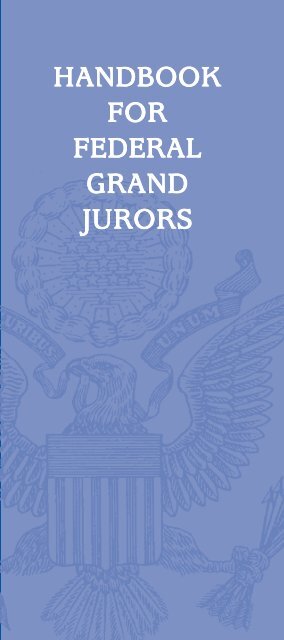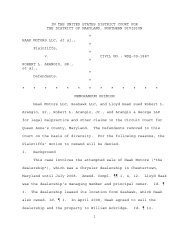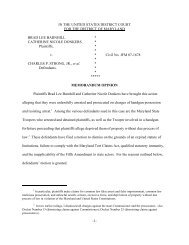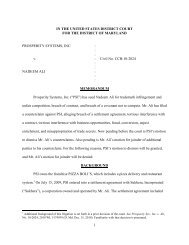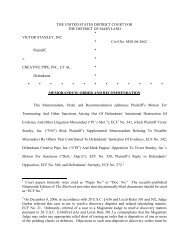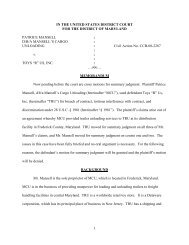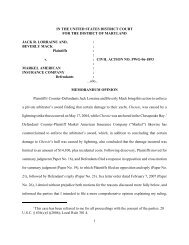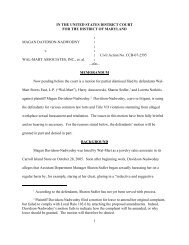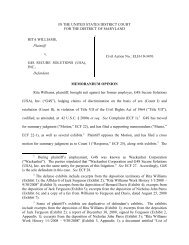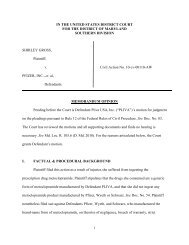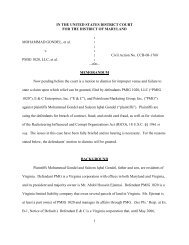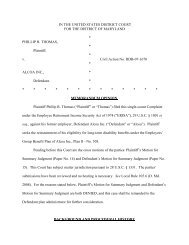HANDBOOK FOR FEDERAL GRAND JURORS - US District Court ...
HANDBOOK FOR FEDERAL GRAND JURORS - US District Court ...
HANDBOOK FOR FEDERAL GRAND JURORS - US District Court ...
You also want an ePaper? Increase the reach of your titles
YUMPU automatically turns print PDFs into web optimized ePapers that Google loves.
<strong>HANDBOOK</strong><br />
<strong>HANDBOOK</strong><br />
<strong>FOR</strong><br />
<strong>FOR</strong><br />
<strong>FEDERAL</strong><br />
<strong>FEDERAL</strong><br />
<strong>GRAND</strong><br />
<strong>GRAND</strong><br />
<strong>JURORS</strong><br />
<strong>JURORS</strong>
Prepared for the use of grand jurors serving in<br />
the United States district courts under the<br />
supervision of the Judicial Conference of the United<br />
States. Published by the Administrative Office of<br />
the United States <strong>Court</strong>s, Washington, D.C. 20544.
CONTENTS<br />
PURPOSE OF THIS <strong>HANDBOOK</strong>........................ 1<br />
ORIGIN AND HISTORY OF THE <strong>GRAND</strong> JURY..... 1<br />
NATURE OF THE <strong>GRAND</strong> JURY .......................... 3<br />
(1) The Grand Jury’s Tasks ......................... 4<br />
(2) Investigation ....................................... 5<br />
SELECTION OF <strong>GRAND</strong> <strong>JURORS</strong> ........................ 5<br />
ORGANIZATION, OATH, AND OFFICERS OF THE<br />
<strong>FEDERAL</strong> <strong>GRAND</strong> JURY ..................................... 6<br />
PROCEDURE .................................................... 7<br />
(1) Quorum .............................................. 7<br />
(2) Evidence Before the Grand Jury ............ 7<br />
(3) Questioning the Witness ...................... 8<br />
(4) Calling the Person Under Investigation<br />
as a Witness ........................................ 9<br />
(5) The Evidence Needed Before a “True Bill”<br />
May Be Voted .................................... 10<br />
(6) Deliberations......................................11<br />
SECRECY ........................................................ 12<br />
PROTECTION OF <strong>GRAND</strong> <strong>JURORS</strong> ................... 13<br />
PRACTICAL SUGGESTIONS <strong>FOR</strong><br />
<strong>GRAND</strong> <strong>JURORS</strong> .............................................. 13<br />
GLOSSARY OF TERMS ..................................... 15
PURPOSE OF THIS <strong>HANDBOOK</strong><br />
This Handbook will acquaint persons who<br />
have been selected to serve on a federal grand jury<br />
with the general nature and importance of their<br />
role as grand jurors. It explains some of the terms<br />
that grand jurors will encounter during their service<br />
and offers some suggestions helpful to them in<br />
performing this important public service. It is<br />
intended that this Handbook will, to a degree,<br />
repeat and provide a permanent record of much of<br />
the information presented in the grand jury<br />
orientation film, The People’s Panel, which in most<br />
districts is shown to grand jurors at the<br />
commencement of their service. Grand jurors are<br />
encouraged to refer to this Handbook periodically<br />
throughout their service to reacquaint themselves<br />
with their duties and responsibilities.<br />
This Handbook is designed as an aid only to<br />
persons serving on a federal - not a state - grand<br />
jury. The federal grand jury is concerned only with<br />
federal crimes; it derives its authority from the<br />
Constitution of the United States, national laws,<br />
and the rules of the federal courts. There are also<br />
grand juries impaneled in many of the states, but<br />
those grand juries investigate only state crimes;<br />
they derive their authority from the constitutions,<br />
laws, and rules of court of the states where they are<br />
impaneled.<br />
ORIGIN AND HISTORY OF THE<br />
<strong>GRAND</strong> JURY<br />
The grand jury has a long and honorable<br />
tradition. It was recognized in the Magna Carta,<br />
the first English constitutional document, which<br />
King John granted in 1215 at the demand of his<br />
subjects. The first English grand jury consisted of<br />
twelve men selected from the knights or other<br />
freemen, who were summoned to inquire into<br />
crimes alleged to have been committed in their<br />
local community. Thus, grand jurors originally<br />
functioned as accusers or witnesses, rather than as<br />
1
judges.<br />
Over the years, the hallmarks of our modern<br />
grand jury developed in England. For example,<br />
grand jury proceedings became secret, and the<br />
grand jury became independent of the Crown. As<br />
a result, a grand jury is able to vote an indictment<br />
or refuse to do so, as it deems proper, without<br />
regard to the recommendations of judge,<br />
prosecutor, or any other person. This<br />
independence from the will of the government was<br />
achieved only after a long hard fight. It can best be<br />
illustrated by the celebrated English case involving<br />
the Earl of Shaftasbury, who, in 1681, fell under<br />
the suspicion of the Crown. Displeased with him,<br />
the Crown presented to the grand jury a proposed<br />
bill of indictment for high treason and<br />
recommended that it be voted and returned. After<br />
hearing the witnesses, the grand jury voted against<br />
the bill of indictment and returned it to the King,<br />
holding that it was not true.<br />
When the English colonists came to America,<br />
they brought with them many of the institutions of<br />
the English legal system, including the grand jury.<br />
Thus, the English tradition of the grand jury was<br />
well established in the American colonies long<br />
before the American Revolution. Indeed, the<br />
colonists used it as a platform from which to assert<br />
their independence from the pressures of colonial<br />
governors. In 1735, for example, the Colonial<br />
Governor of New York demanded that a grand jury<br />
indict for libel John Zenger, editor of a newspaper<br />
called “The Weekly Journal,” because he had held<br />
up to scorn certain acts of the Royal Governor. The<br />
grand jury flatly refused.<br />
The grand jury as an institution was so firmly<br />
established in the traditions of our forebears that<br />
they included it in the Bill of Rights. The Fifth<br />
Amendment to the Constitution of the United<br />
States provides in part that “(n)o person shall be<br />
held to answer for a capital, or otherwise infamous<br />
crime, unless on a presentment or indictment of a<br />
2
Grand Jury . . . .” Moreover, the grand jury system<br />
is also recognized in the constitutions of many of<br />
the states of the Union.<br />
NATURE OF THE <strong>GRAND</strong> JURY<br />
The powers and functions of the federal grand<br />
jury differ from those of the federal trial jury, which<br />
is called the petit jury. The petit jury listens to the<br />
evidence offered by the prosecution and the<br />
defense (if it chooses to offer any) during a<br />
criminal trial and returns a verdict of guilty or not<br />
guilty. The grand jury, on the other hand, does not<br />
determine guilt or innocence, but only whether<br />
there is probable cause to believe that a crime was<br />
committed and that a specific person or persons<br />
committed it. If the grand jury finds probable<br />
cause to exist, then it will return a written<br />
statement of the charges called an “indictment.”<br />
After that, the accused will go to trial.<br />
The grand jury normally hears only that<br />
evidence presented by an attorney for the<br />
government which tends to show the commission<br />
of a crime. The grand jury must determine from<br />
this evidence, and usually without hearing<br />
evidence for the defense, whether a person should<br />
be tried for a serious federal crime, referred to in<br />
the Bill of Rights as an “infamous crime.” An<br />
infamous crime is one which may be punished by<br />
imprisonment for more than one year. As a<br />
general rule, no one can be prosecuted for a<br />
serious crime unless the grand jury decides that<br />
the evidence it has heard so requires. In this way,<br />
the grand jury operates both as a “sword,”<br />
authorizing the government’s prosecution of<br />
suspected criminals, and also as a “shield,”<br />
protecting citizens from unwarranted or<br />
inappropriate prosecutions. A person may,<br />
however, waive grand jury proceedings and agree<br />
to be prosecuted by a written charge of crime<br />
called an information.<br />
3
The grand jury is not completely free to<br />
compel a trial of anyone it chooses. The United<br />
States Attorney must sign the indictment before<br />
one may be prosecuted. Thus, the government<br />
and the grand jury act as checks upon each other.<br />
This assures that neither may arbitrarily wield the<br />
awesome power to indict a person of a crime.<br />
(1) The Grand Jury’s Tasks<br />
As stated above, the federal grand jury’s<br />
function is to determine whether a<br />
person shall be tried for a serious federal<br />
crime alleged to have been committed<br />
within the district where it sits. Matters<br />
may be brought to its attention in three<br />
ways: (1) by the United States Attorney<br />
or an Assistant United States Attorney;<br />
(2) by the court that impaneled it; and<br />
(3) from the personal knowledge of a<br />
member of the grand jury or from<br />
matters properly brought to a member’s<br />
personal attention. In all these cases,<br />
the grand jury must hear evidence<br />
before taking action.<br />
After it has received evidence against a<br />
person, the grand jury must decide<br />
whether the evidence presented justifies<br />
an indictment, or “true bill,” which is<br />
the formal criminal charge returned by<br />
the grand jury. Upon the indictment’s<br />
being filed in court, the person accused<br />
must either plead guilty or nolo<br />
contendere or stand trial.<br />
If the evidence does not persuade the<br />
grand jury that there is probable cause<br />
to believe the person committed a<br />
crime, the grand jury will vote a “no<br />
bill,” or “not a true bill.” When this<br />
occurs, the person is not required to<br />
plead to a criminal charge, and no trial is<br />
required.<br />
4
(2) Investigation<br />
The major portion of the grand jury’s<br />
work is concerned with evidence<br />
brought to its attention by an attorney<br />
for the government. The grand jury<br />
may consider additional matters<br />
otherwise brought to its attention, but<br />
should consult with the United States<br />
Attorney or the court before undertaking<br />
a formal investigation of such matters.<br />
This is necessary because the grand jury<br />
has no investigative staff, and legal<br />
assistance will be necessary in the event<br />
an indictment is voted.<br />
It should be borne in mind that a federal<br />
grand jury can take action only upon<br />
federal crimes that have been<br />
committed within the district in which it<br />
has been impaneled. Furthermore, a<br />
federal grand jury (except a special<br />
grand jury impaneled under 18 U.S.C.<br />
§§ 3331-3334) is not authorized to<br />
investigate situations involving the<br />
conduct of individuals, public officials,<br />
agencies or institutions that the grand<br />
jury believes is subject to mere criticism<br />
rather than a violation of federal<br />
criminal statutes. Its concern must be<br />
devoted solely to ascertaining whether<br />
there is probable cause to believe that a<br />
federal crime has been committed and<br />
to report accordingly to the court.<br />
SELECTION OF <strong>GRAND</strong> <strong>JURORS</strong><br />
Federal law requires that a grand jury be<br />
selected at random from a fair cross section of the<br />
community in the district or division in which the<br />
federal grand jury convenes. Thus, all citizens have<br />
an equal opportunity and obligation to serve.<br />
Pursuant to law, the names of prospective<br />
grand jurors are drawn at random from lists of<br />
5
egistered voters or lists of actual voters, or other<br />
sources when necessary, under procedures<br />
designed to ensure that all groups in the<br />
community will have a fair chance to serve. Those<br />
persons whose names have been drawn and who<br />
are not exempt or excused from service are<br />
summoned to appear for duty as grand jurors.<br />
When these persons appear before the court, the<br />
presiding judge may consider any further requests<br />
to be excused. The judge will then direct the<br />
selection of 23 qualified persons to become the<br />
members of the grand jury.<br />
ORGANIZATION, OATH, AND<br />
OFFICERS OF THE <strong>FEDERAL</strong> <strong>GRAND</strong><br />
JURY<br />
After the proper number of persons have<br />
been qualified as grand jurors, the court will<br />
appoint one of them to be the foreperson, or<br />
presiding officer, of the grand jury. A deputy<br />
foreperson will also be appointed, so that he or she<br />
can act as presiding officer in the foreperson’s<br />
absence.<br />
The foreperson, the deputy foreperson, and<br />
the remaining members of the grand jury are<br />
sworn in by the Clerk of the <strong>Court</strong>. Those persons<br />
who do not wish to swear may affirm.<br />
The oath taken by the grand jurors binds<br />
them to inquire diligently and objectively into all<br />
federal crimes committed within the district of<br />
which they have or may obtain evidence and to<br />
conduct such inquiry without malice, fear, hatred,<br />
or other emotion.<br />
After the grand jurors have been sworn, the<br />
presiding judge advises the grand jury of its<br />
obligations and how best to perform its duties.<br />
This is called the charge to the grand jury. Careful<br />
attention must be paid to the charge, for it and any<br />
additional instructions that may be given by the<br />
court contain the rules and directions the grand<br />
jury must follow during its term of service.<br />
6
After the grand jury has been charged, it is<br />
taken to the grand jury room, where it will hear<br />
testimony and consider documentary evidence in<br />
the cases brought to its attention by the United<br />
States Attorney or an Assistant United States<br />
Attorney.<br />
PROCEDURE<br />
(1) Quorum<br />
Sixteen of the 23 members of the grand<br />
jury constitute a quorum for the<br />
transaction of business. If fewer than<br />
this number are present, even for a<br />
moment, the proceedings of the grand<br />
jury must stop. This shows how<br />
important it is that each grand juror<br />
conscientiously attend the meetings. If<br />
an emergency will prevent a grand<br />
juror’s attendance at the meeting, he or<br />
she must promptly advise the grand jury<br />
foreperson. If the juror’s absence will<br />
prevent the grand jury from acting, the<br />
grand juror should, if at all possible,<br />
attend the meeting.<br />
(2) Evidence Before the Grand Jury<br />
Much of the grand jury’s time is spent<br />
hearing testimony by witnesses and<br />
examining documentary or other<br />
evidence in order to determine whether<br />
such evidence justifies an indictment.<br />
Each federal court district has a United<br />
States Attorney whose duty it is to<br />
represent the United States in federal<br />
matters within the district and to<br />
prosecute those accused of federal<br />
crimes. In the usual case, the United<br />
States Attorney or one of the Assistant<br />
United States Attorneys will present the<br />
evidence of alleged violations of the law<br />
to the grand jury. These attorneys also<br />
advise grand jurors as to what witnesses<br />
7
should be called and what documentary<br />
evidence should be produced for<br />
examination by the grand jury. The<br />
grand jury may ask that additional<br />
witnesses be called if it believes this<br />
necessary. The United States Attorney<br />
will also prepare the formal written<br />
indictments that the grand jury wishes<br />
to present. But neither the United States<br />
Attorney nor any Assistant United States<br />
Attorney may remain in the room while<br />
the grand jury deliberates and votes on<br />
an indictment.<br />
(3) Questioning the Witness<br />
Witnesses are called to testify one after<br />
another. Upon appearing to give<br />
testimony, each witness will be sworn<br />
by the grand jury foreperson or, in the<br />
foreperson’s absence, the deputy<br />
foreperson. The witness will then be<br />
questioned. Ordinarily, the attorney for<br />
the government questions the witness<br />
first, followed next by the foreperson of<br />
the grand jury. Then, the other<br />
members of the grand jury may<br />
question the witness.<br />
All questions asked of each witness<br />
must be relevant and proper, relating<br />
only to the case under investigation. If<br />
doubt should arise as to whether a<br />
question is appropriate, the advice of the<br />
United States Attorney may be sought.<br />
If necessary, a ruling may be obtained<br />
from the court.<br />
Because of the need for secrecy,<br />
described in more detail in the following<br />
section, the law forbids anyone other<br />
than authorized persons from being<br />
present in the grand jury room while<br />
evidence is being presented. This<br />
means that only the grand jury, the<br />
8
United States Attorney or the Assistant<br />
United States Attorney, the witness<br />
under examination, the court reporter,<br />
and interpreters when needed may be<br />
present. If an indictment should<br />
ultimately be voted, the presence of<br />
unauthorized persons in the grand jury<br />
room could invalidate it.<br />
Occasionally, prior to answering a<br />
question, a witness may ask to leave the<br />
grand jury room to consult with his or<br />
her attorney. The grand jury is to draw<br />
no adverse inference from such conduct,<br />
for every witness has the right to confer<br />
with counsel even though counsel may<br />
not be present in the grand jury room.<br />
In fact, a witness may confer with<br />
counsel after each question, as long as<br />
he or she does not make a mockery of<br />
the proceedings or does not, by such,<br />
make an attempt to impede the orderly<br />
progress of the grand jury investigation.<br />
Additionally, a witness who is appearing<br />
before the grand jury may invoke the<br />
Fifth Amendment privilege against selfincrimination<br />
and refuse to answer a<br />
question. In such a situation, the grand<br />
jurors may bring the matter before the<br />
court in order to obtain a ruling as to<br />
whether or not the answer may be<br />
compelled. One manner in which an<br />
answer may be compelled is by granting<br />
the witness immunity from prosecution<br />
in exchange for the witness’ testimony.<br />
(4) Calling the Person Under Investigation<br />
as a Witness<br />
Normally, neither the person under<br />
investigation (sometimes referred to as<br />
the “accused,” although this does not<br />
imply he or she is guilty of any crime)<br />
nor any witness on the accused’s behalf<br />
9
will testify before the grand jury.<br />
Upon request, preferably in writing, an<br />
accused may be given the opportunity<br />
by the grand jury to appear before it. An<br />
accused who does so appear cannot be<br />
forced to testify because of the<br />
constitutional privilege against selfincrimination.<br />
If the grand jury<br />
attempts to force the accused to testify,<br />
an indictment returned against that<br />
person may be nullified.<br />
Because the appearance of an accused<br />
before the grand jury may raise<br />
complicated legal problems, a grand jury<br />
that desires to request or to permit an<br />
accused to appear before it should<br />
consult with the United States Attorney<br />
and, if necessary, the court before<br />
proceeding.<br />
Even if the accused is willing to testify<br />
voluntarily, it is recommended that he or<br />
she first be warned of the right not to<br />
testify. Also, he or she may be required<br />
to sign a formal waiver of this right. The<br />
grand jury should be completely<br />
satisfied that the accused fully<br />
understands what he or she is doing.<br />
(5) The Evidence Needed Before a “‘True<br />
Bill” May Be Voted<br />
It is the responsibility of the grand jury<br />
to weigh the evidence presented to it in<br />
order to determine whether this<br />
evidence, usually without any<br />
explanation being offered by the<br />
accused, persuades it that there is<br />
probable cause to believe that a crime<br />
has been committed and that the<br />
accused was the person who committed<br />
it. Remember that the grand jury is not<br />
responsible for determining whether the<br />
10
accused is guilty beyond a reasonable<br />
doubt, but only whether there is<br />
sufficient evidence of probable cause to<br />
justify bringing the accused to trial.<br />
Only the evidence presented to the<br />
grand jury in the grand jury room may<br />
be considered in determining whether<br />
to vote an indictment.<br />
(6) Deliberations<br />
When the grand jury has received all the<br />
evidence on a given charge, all persons<br />
other than the members of the grand<br />
jury or an interpreter to assist a juror<br />
who is hearing or speech impaired,<br />
must leave the room so that the grand<br />
jury may begin its deliberations. The<br />
presence of any other person in the<br />
grand jury room while the grand jury<br />
deliberates or votes may nullify an<br />
indictment returned on the accusation.<br />
After all persons other than the grand<br />
jury members and any interpreter for a<br />
hearing or speech impaired juror have<br />
left the room, the foreperson will ask the<br />
grand jury members to discuss and vote<br />
upon the question of whether the<br />
evidence persuades the grand jury that a<br />
crime has probably been committed by<br />
the person accused and that an<br />
indictment should be returned. Every<br />
grand juror has the right to express his<br />
or her view of the matter under<br />
consideration, and grand jurors should<br />
listen to the comments of all their fellow<br />
grand jurors before making up their<br />
mind. Only after each grand juror has<br />
been given the opportunity to be heard<br />
will the vote be taken. It should be<br />
remembered that at least 16 jurors must<br />
be present and 12 members must vote<br />
in favor of the indictment before it may<br />
be returned.<br />
11
SECRECY<br />
The foreperson of the grand jury must<br />
keep a record of the number of jurors<br />
concurring in the finding of every<br />
indictment and file the record with the<br />
Clerk of the <strong>Court</strong>. If an indictment is<br />
found, the grand jury will report it to the<br />
judge or a magistrate judge in open<br />
court. It will likewise report any “not<br />
true bills,” or decisions not to indict. A<br />
decision not to indict should<br />
immediately be reported to the court in<br />
writing by the foreperson so that the<br />
accused may promptly be released from<br />
jail or freed from bail.<br />
The law imposes upon each grand juror a<br />
strict obligation of secrecy. This obligation is<br />
emphasized in the oath each grand juror takes and<br />
in the charge given to the grand jury by the judge.<br />
The tradition of secrecy continues as a vital<br />
part of the grand jury system for many reasons. It<br />
protects the grand jurors from being subjected to<br />
pressure by persons who may be subjects of<br />
investigations by the grand jury or associates of<br />
such persons. It prevents the escape of those<br />
against whom an indictment is being considered.<br />
It encourages witnesses before the grand jury to<br />
give full and truthful information as to the<br />
commission of a crime. It also prevents tampering<br />
with or intimidation of such witnesses before they<br />
testify at trial. Finally, it prevents the disclosure of<br />
investigations that result in no action by the grand<br />
jury and avoids any stigma the public might attach<br />
to one who is the subject of a mere investigation<br />
by the grand jury.<br />
Essentially, the grand jury may disclose<br />
matters occurring before it only to the attorneys for<br />
the government for use in the performance of their<br />
duties, but even attorneys for the government may<br />
not be informed of what took place during the<br />
12
grand jury’s deliberations and voting. The only<br />
other time matters occurring before the grand jury<br />
may be disclosed to anyone is when disclosure is<br />
ordered by the court in the interests of justice.<br />
Disclosure of such matters may never be made to<br />
grand juror’s friends or family, including a grand<br />
juror’s spouse.<br />
PROTECTION OF <strong>GRAND</strong> <strong>JURORS</strong><br />
The secrecy imposed upon grand jurors is a<br />
major source of protection for them. In addition,<br />
no inquiry may be made to learn what grand jurors<br />
said or how they voted, except upon order of the<br />
court.<br />
The law gives the members of a grand jury<br />
broad immunity for actions taken by them within<br />
the scope of their authority as grand jurors.<br />
Because of this immunity, all grand jurors<br />
must perform their duties with the highest sense of<br />
responsibility.<br />
PRACTICAL SUGGESTIONS <strong>FOR</strong><br />
<strong>GRAND</strong> <strong>JURORS</strong><br />
Each grand juror should attend the grand jury<br />
sessions regularly, in order to ensure that a quorum<br />
of 16 members will be present to conduct the<br />
grand jury’s business.<br />
Each grand juror should be on time for each<br />
meeting so that others are not kept waiting.<br />
The time of meetings should be scheduled so<br />
as to be convenient for the grand jury, the United<br />
States Attorney, and the witnesses.<br />
Witnesses should be treated courteously<br />
when they appear before the grand jury. Questions<br />
should be put to them in an orderly fashion. The<br />
United States Attorney should complete his or her<br />
questioning of each witness before the foreperson<br />
asks questions. The remaining grand jurors will<br />
then have a chance to ask relevant and proper<br />
questions.<br />
13
Each grand juror has an equal voice in<br />
determining whether or not an indictment should<br />
be returned. Therefore, it is important that all<br />
grand jurors pay close attention to the testimony<br />
and other evidence presented.<br />
Each grand juror must be absolutely fair in his<br />
or her judgment of the facts. Otherwise, the grand<br />
juror will defeat the democratic purpose the grand<br />
jury is designed to serve.<br />
During deliberations on a case, each grand<br />
juror should feel free to express his or her opinion<br />
based upon the evidence.<br />
Each juror has equal duties and<br />
responsibilities, and each is entitled to be satisfied<br />
with the evidence before being called upon to vote.<br />
No juror has the right to dismiss a witness or to<br />
shut off proper discussion if other jurors wish to<br />
pursue the matter further.<br />
No grand jury should undertake to investigate<br />
matters outside its proper scope merely because<br />
someone suggested an investigation, or because<br />
the investigation would be interesting.<br />
No grand juror should discuss the cases under<br />
investigation with anyone, except fellow grand<br />
jurors and the United States Attorney or the<br />
Assistant United States Attorney, and then only in<br />
the grand jury room. Of course, the grand jurors<br />
may always seek the advice of the judge.<br />
Finally, every citizen who is selected to serve<br />
on a federal grand jury should bring to this task the<br />
determination to participate in a responsible<br />
manner and to make every effort to ensure that the<br />
grand jury will be a credit not only to the<br />
community it represents but to the United States.<br />
14
GLOSSARY OF TERMS<br />
Accused:<br />
The person accused of the commission of a<br />
federal crime. Use of this term does not imply the<br />
person under investigation is guilty of any crime.<br />
After a person is indicted by the grand jury, that<br />
person is referred to as the “defendant.”<br />
Charge to the Grand Jury:<br />
Given by the judge presiding over the<br />
selection and organization of the grand jury, the<br />
charge is the court’s instructions to the grand jury<br />
as to its duties, functions, and obligations, and how<br />
to best perform them.<br />
Deliberations:<br />
The discussion by the grand jury members as<br />
to whether or not to return an indictment on a<br />
given charge against an accused. During<br />
deliberations no one except the grand jury<br />
members or an interpreter for a hearing or speech<br />
impaired juror may be present.<br />
<strong>District</strong>:<br />
The geographical area over which the federal<br />
district court where the grand jury sits and the<br />
grand jury itself have jurisdiction. The territorial<br />
limitations of the district will be explained to the<br />
grand jury by the district judge.<br />
Evidence:<br />
Testimony of witnesses, documents, and<br />
exhibits as presented to the grand jury by an<br />
attorney for the government or otherwise properly<br />
brought before it. In some instances, the person<br />
under investigation may also testify.<br />
Federal:<br />
The national government as distinguished<br />
from the state governments.<br />
15
Grand Jurors’ Immunity:<br />
Immunity is granted to all grand jurors for<br />
their authorized actions while serving on a federal<br />
grand jury and means that no grand juror may be<br />
penalized for actions taken within the scope of his<br />
or her service as a grand juror.<br />
Indictment:<br />
The written formal charge of a crime by the<br />
grand jury, returned when 12 or more grand jurors<br />
vote in favor of it.<br />
Information:<br />
The written formal charge of crime by the<br />
United States Attorney, filed against an accused<br />
who, if charged with a serious crime, must have<br />
knowingly waived the requirements that the<br />
evidence first be presented to a grand jury.<br />
“No Bill”:<br />
Also referred to as “not a true bill,” the “no<br />
bill” is the decision by the grand jury not to indict a<br />
person.<br />
Petit Jury:<br />
The trial jury, composed of 12 members, that<br />
hears a case after indictment and renders a verdict<br />
or decision after hearing the prosecution’s entire<br />
case and whatever evidence the defendant chooses<br />
to offer.<br />
Probable Cause:<br />
The finding necessary in order to return an<br />
indictment against a person accused of a federal<br />
crime. A finding of probable cause is proper only<br />
when the evidence presented to the grand jury,<br />
without any explanation being offered by the<br />
accused, persuades 12 or more grand jurors that a<br />
federal crime has probably been committed by the<br />
person accused.<br />
16
Quorum for Grand Jury to Conduct Business:<br />
Sixteen of the 23 members of a federal grand<br />
jury must at all times be present at a grand jury<br />
session in order for the grand jury to be able to<br />
conduct business.<br />
United States Attorney:<br />
The chief legal officer for the United States<br />
government in each federal district.<br />
17
HB101<br />
Administrative Office<br />
of the<br />
United States <strong>Court</strong>s<br />
Washington, D.C. 20544


